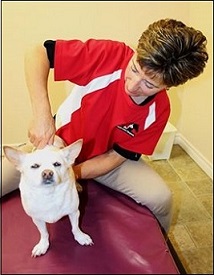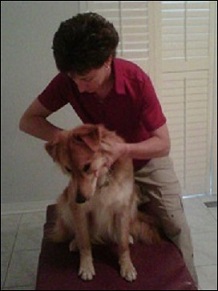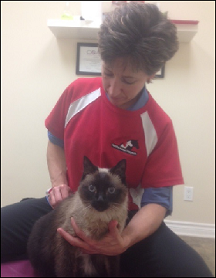Canine & Feline Chiropractic
Many people think of chiropractic care only when their pet is experiencing pain and mobility issues from injuries or advancing age. However, regular chiropractic check-ups for your pet starting at a young age (i.e. puppy) to adulthood can help prevent injuries and greatly enhance your pet's overall mobility and health throughout their lifetime. Regular chiropractic checkups for your pet helps identify spinal and joint-related issues BEFORE they become problematic.
Unfortunately many biomechanical problems or injuries aren't always evident, but there are however some obvious indications of dysfunction. The following signs in a dog or cat may indicate dysfunction in the neuro-musculoskeletal system:
- Difficulty climbing stairs or jumping onto raised areas
- Changes in movement or reluctance to move
- Stiffness (i.e. upon rising after lying down)
- Abnormal posture (i.e. roach back), altered sitting position
- Signs of pain or discomfort during certain movements
- Abnormal gait, shortened stride in one or more legs, the hind end does not swing
- Lameness in one or more limbs
- Changes in behaviour such as increased scratching or licking
- Limited performance, decreased energy or activity level
- Sensitivity to touch when being groomed, petted or picked up
- Muscular wasting or weakness, weakness in hind end
According to the College of Animal Chiropractors (CoAC) and the American Veterinary Chiropractic Association (AVCA), the following additional conditions may benefit from chiropractic care:
- Arthritis (in the spine and limbs)
- Degenerative disc/joint disease
- Injuries, strains/sprains related to slips, falls, training, etc.
- Secondary effects from hip and elbow dysplasia
- Patella (knee cap) luxations
- TMJ or jaw problems
- Post-surgical care to manage compensatory effects and improve healing (i.e. knee/ACL surgery)
- Wobbler's syndrome
- Conditions that might not be responding as well to traditional veterinary care (i.e. lick granulomas, urinary incontinence, seizures)




